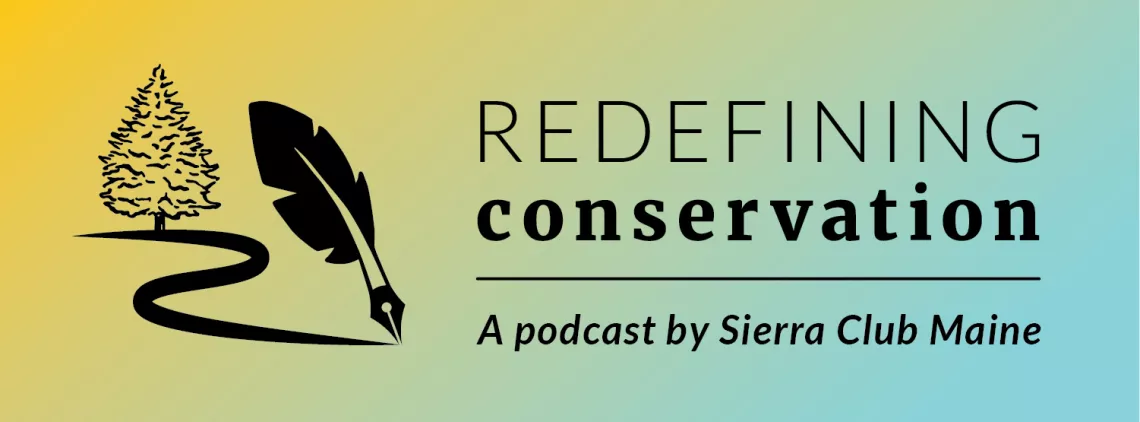
Sierra Club Maine launched our first ever podcast series, Redefining Conservation, on November 1, 2023. The podcast focuses on the need to preserve 30 percent of the state’s land, water, and forest by 2030, and beyond. Specifically, it will explore the 30x30 goal’s impact on Maine and the strategies used to achieve it. As climate change and habitat destruction exacerbate biodiversity loss, protecting what’s left will be crucial. And, it must be done in a just and equitable way.
Redefining Conservation also gives us the opportunity to explore the intersection between conservation and other forms of social justice such as pollution, water quality issues, ownership, and access. Listeners can expect to hear interviews with community organizers, scientists, BIPOC and youth leaders, and housing advocates who will be a part of creating a shared conservation future in Maine. Listen and follow here! See more details on our podcast page.
Questions or comments? Submit them here or contact us at maine.chapter@sierraclub.org.
30x30 + “the other 70%”
At Sierra Club, our vision for the 30x30 campaign is to safeguard and restore nature's invaluable gifts by securing permanent protection for 30% of lands and waters by the year 2030. We believe achieving this ambitious goal will be essential to protecting the biodiversity of our world, minimizing climate change, and preserving equitable access to nature for all communities.
Since our 30x30 team started two facts have become apparent:
- Maine is well on its way to conserving 30% of our land area by 2030, and
- in some ways, the more important question is what we plan to do about the other 70%.
Our goal is to help imagine the ideal State of Maine in 2050. Perhaps 50% of our landscape is set aside as some form of conserved wildlands, meeting the aspirational target set forth in E.O. Wilson’s book Half-Earth. Another 30% lies in protected woodlands, where timber companies have adopted sustainable management practices that allow forests to mature. Changes to zoning and town planning policies have allowed towns and cities to build innovative housing that combines density with access to greenspace, both addressing existing housing needs and accommodating population growth from so-called “climate migration.” Yes, the winters are warmer, droughts come more often, and invasive species continue to threaten our native ecosystems, but both our human and natural communities have the resources they need to respond to a changing climate. We need to coalesce the public around a vision for 2050 and facilitate the necessary policy to realize those goals.
BIPOC Focus
Conserving 30% of Maine's forestry, water resources, wildlife and biodiversity by 2030 is a crucial component of the Maine Won't Wait Plan and a nationwide campaign that aims to safeguard 30% of the United States' lands and waters by 2030. The 30x30 initiative plays a pivotal role in prioritizing the environmental needs of frontline communities for the future.
This ambitious objective centers around partnering with Tribal Nations, BIPOC and frontline communities, and prioritizing their needs and guidance on fostering interconnected habitats where wildlife, plants, and people can flourish. To bring this vision to fruition it is essential to co-create strategies and tactics in collaboration with those who represent BIPOC communities in the climate movement. Within this collaborative space, our focus can span various areas, including but not limited to smart growth, organizing for land reclamation, sustainable forestry practices, water resources, equitable cooperative housing and land trusts, restorative/regenerative agriculture, environmental education, ensuring environmental access, and fostering overall community autonomy with the land.
The Story
Why does this 30x30 campaign matter to the Sierra Club and the 30x30 coalition?
- We believe we must transform our social systems and structures—from an exploitative economy built on fossil fuels to a regenerative society built on sustainability, ecosystem protection, democracy, and interdependence. 30x30 is one such necessary transformation.
- The collaborative and intersectional focus of this campaign means that the efforts can span various areas and spark action across many communities.
Why does this 30x30 campaign matter for all Mainers?
- The outdoors and its natural resources, such as clean air and clean water, are a human right. Equitable conservation initiatives such as this campaign aim to close the nature equity gap so that everyone can have access to nature.
- Maine is a state with an identity built on the outdoors. Outdoor recreation on our trails and mountains, popular sports such as mountain-biking and skiing, and our economy of tourism, fisheries, farms, and lumber would not be possible without conserved lands and waters.
Why is this 30x30 campaign important now?
- The climate crisis needs to be addressed with the urgency that science and justice requires. 30x30 is part of the urgent action that needs to occur worldwide.
- Nature access and preserved lands are essential for public health, as green spaces and healthy oceans improve temperatures, air quality, and food security. As the climate crisis fuels more extreme weather than ever, 30x30 is a tool to adapt and mitigate these disasters.